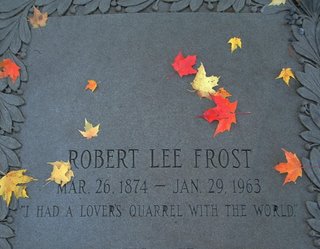Friday, December 22, 2006
A Lover's Quarrel with the World
I am especially mindful of it at Christmas. Many have embraced it. It feeds on Darwinian theory, post-Kantian philosophy, the harsh realities of modern urban and industrial life, and the tidal wave of technologies. Many learn it when they became “too mature” to read fairy tales. The new literature professor introduces them to it through Emily Dickinson, Friedrich Nietzsche, and Richard Rorty. Bishop Spong convinces them of it through his argument that the biblical account of creation and fall is “pre-Darwinian mythology and post-Darwinian nonsense.” Richard Dawkins helps clarify it when he preaches that only a fool would believe “The God Delusion.” What is it?
Max Weber called it “The disenchantment of the world.” Herman Melville refers to this disenchantment in Moby-Dick: “Our souls are like those orphans whose unwedded mothers die in bearing them: the secret of our paternity lies in their grave, and we must go there to learn it.” Robert Frost composed a song of disenchantment:
There is a singer everyone has heard,
Loud, a mid-summer and a mid-wood bird,
Who makes the solid tree trunks sound again.
………………………………………………
He says the highway dust is over all.
The bird would cease and be as other birds
But that he knows in singing not to sing.
The question that he frames in all but words
Is what to make of a diminished thing.
If the cosmos is mindless machine, nature reveals nothing, God is wish-fulfillment, and there is no one out there, what are we to make of this “diminished thing”? This tormented Frost. Later, in “The Most of It,” he wrote,
He thought he kept the universe alone;
For all the voice in answer he could wake
Was but the mocking echo of his own
From some tree–hidden cliff across the lake.
Some morning from the boulder–broken beach
He would cry out on life, that what it wants
Is not its own love back in copy speech,
But counter–love, original response.
Unlike many of his “enlightened” contemporaries, Robert Frost could not accept the silent melancholy of a disenchanted world and the hopeless, echoing sound of his own voice. He longed for “counter-love, original response.” As far as I know, he never found it. He continued his “lover’s quarrel with world.” This seeking of wonder, beauty, and “original response” sounds notes of humility, loss, and deep sadness in Frost’s poetry as a whole.
He never found what G.K. Chesterton, a liberal Unitarian turned Christian, found:
The Christ-child lay on Mary's lap,
His hair was like a light.
(O weary, weary were the world,
But here is all aright.)
The Christ-child lay on Mary's breast
His hair was like a star.
(O stern and cunning are the kings,
But here the true hearts are.)
The Christ-child lay on Mary's heart,
His hair was like a fire.
(O weary, weary is the world,
But here the world's desire.)
The Christ-child stood on Mary's knee,
His hair was like a crown,
And all the flowers looked up at Him,
And all the stars looked down.
Subscribe to:
Post Comments (Atom)




2 comments:
Rev. Mercer,
Many thanks for your faithful and thoughtful blogging this year. The Lord has used this blog to encourage me and to challenge my thinking. I appreciate your work. May God continue to use First Presbyterian Church to bring glory to Himself and to advance His Kingdom. Merry Christmas and Happy New Year.
Thank you Josh. Merry Christmas!
Post a Comment